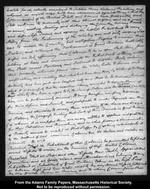This Resolution and Order was indeed assuming the Powers of Government in a manner as offensive, as the Measures We proposed could have been: But it left all the Powers of Government in the hands of Assemblies, Conventions and Committees, which composed a Sc ne of much Confusion and Injustice the Continuance of which was much dreaded by me, as tending to injure the Morals of the People and destroy their habits of order, and Attachment to regular Government. However I could do nothing but represent and remonstrate: The Vote as yet was against me.

Key to Colors and Formatting
Rest the mouse over bolded names of people and places to view additional information.
Cancelled text appears with a line through it.
Unreadable cancelled text appears as [illegible]
Additions and insertions appear in gray superscript.
[Supplied words] appear blue in square brackets. They have been added to clarify, correct, or complete passages appearing in the documents.
[Explanatory notes] appear red and italicized, in brackets.
[Links to other documents] appear bold green in brackets.



